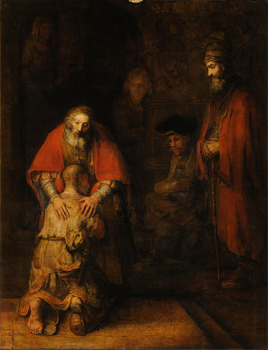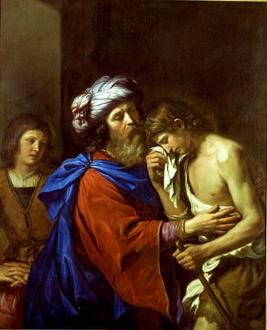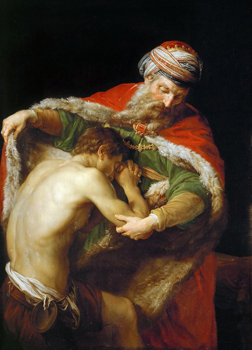For Sunday March 6th, 2016, RCL
Fourth Sunday in Lent
Lectionary Readings (Revised Common Lectionary, Year C)
Joshua 5:9-12
Psalm 32
2 Corinthians 5:16-21
Luke 15: 1-3, 11-32
"Once there was a man who had two sons." So begins "The Parable of the Prodigal Son," one of the best-loved stories in the New Testament. I grew up hearing the famous parable of "the boy who ran" and "the boy who stayed" in Sunday School, youth group, Bible studies, and Sunday morning sermons. By the time I was an adult, I'd heard it — and heard countless interpretations of it — so many times that I literally couldn't hear it anymore. I was saturated. As Barbara Brown Taylor puts it, the parable had become "limp" for me. "Limp from too much handling."
Nevertheless, I spent the past couple of weeks trying to write a traditional lectionary essay on the parable, as required by the R.C.L for this 4th week of Lent. Unsurprisingly, my attempts fell flat. What follows — a personal letter to each of the two sons — is my attempt to creatively re-engage the story, to reflect on its meanings with fresh eyes and a (hopefully) open heart.
To the Boy Who Ran:
I begin with you, because you're the strangest and least accessible to me. Impetuous. Careless. Demanding. So selfish, you take my breath away.
On the face of things, you and I have nothing in common. I've never run away, or squandered an inheritance, or broken my parents' hearts. Neither have I felt the ardent, tear-soaked embrace of a lovesick father — human or divine — welcoming me home.
Maybe this is why I dislike you. Am I envious because God is generous? Am I hurt because the Father's love is a wild, unfettered thing, unpredictable and unfair? Yes, I am.
YES. I AM.
I wish I knew for sure that your penitence was genuine. I wish I had a guarantee that you understood — not just in your head but with your whole heart — just how much fear, destruction, and sorrow you caused. I'm okay with forgiving you, but only if you're sorry beyond language. Only if you bleed repentance.
I also wish I knew for sure that you pulled your act together, once the party was over and the fatted calf was eaten. Did you get up early the next morning and pull your weight in the fields? Did you apologize to your brother, or ask after the health of your Father? Did you humble yourself, and make peace with the villagers? Did you understand that really, there could be no such thing as going home? Not in any simple way? Everything — everything — would have to change.
 |
This is a problem, of course — my lack of charity. I want to accuse you of having no empathy — of not giving a damn about how you ripped your Father's heart out of his chest — but here I am, completely uninterested in empathizing with you.
So I'm digging down, trying extra hard to reach you. Who are you beneath the labels? Beneath "Prodigal," beneath "Sinner," beneath "Poster Boy for God's Great Kindness?" I grew up in the Church, a quiet Good Kid in my Father's shadow. I don't have a dramatic conversion story like yours. What could you possibly have to teach me?
"Dying of hunger." That's how your story describes your final days in that far-off country. When your costly adventure was over, when your funds ran dry, when your so-called friends abandoned you. There among the pigs, covered in filth, you finally realized who and what you were. "Dying of hunger." May I give you a new label? A new name? One that I can relate to? Aren't you, at the very core, The Hungry One?
It was hunger, wasn't it, that first lured you away from a good life and a good Father? A gluttonous hunger, maybe, but hunger still. For freedom? Self-expression? Meaning? Peace? Something in you — something wild and insistent — needed feeding, and your Father, in his vast, unorthodox wisdom, understood.
I can't hold the long view as skillfully as he does, but I suppose his letting you go makes a savvy kind of sense. You couldn't return home without leaving. You couldn't taste resurrection without dying. Maybe we need to know hunger — know it on the tongue, in the gut, like a fire in our bones — to truly savor the Feast.
The Father understood. What a remarkable thing that is — his deep, patient knowing. He respected the hunger that pulled you away. He knew a wiser, sharper hunger would bring you home.
Was it admirable? What you did? I don't know. But there is this: even though it cost you, even though it wounded your family, you honored your hunger. I can't speak to the rightness or wrongness of your decision — I dare not — but maybe there is something in your story I should attend to. I usually ignore my hunger. When I can't ignore it, I hide, minimize, and vilify it. Is there a chance my hunger wants to point me to God?
Your journey ends in a passionate embrace. Unrestrained welcome, overflowing joy. Were you grateful? I will never know. It seems your Father didn't much care; he just wanted to feed and clothe you.
There's so little of your experience I can relate to, much less applaud. Despite my best attempts to reconcile my heart with yours, my envy remains. Your Father ran to welcome you. He cared for nothing in this world so much as having you safe and snug in his arms. No matter what the preachers say, this is not everyone's visceral experience. To hear we are loved is one thing. To feel ourselves embraced is another.
But at least you and I have this in common: I know what it's like to hunger. To hunger for love, for depth, for passion, for joy. And I know what it's like to imagine an exotic Elsewhere, a more perfect nourishment miles away from my Father's all-too-familiar table. I know what it's like to "come to myself" in the broken, impoverished places of my own foolish fashioning, and to long for the warmth and sustenance of a home.
I don't like you. But maybe we're not so very different after all.
 |
To the Boy Who Stayed:
I won't lie; my sympathies lie most naturally with you. Your story haunts me. Your resentments mirror mine. Whenever I think of you standing — appalled — outside your Father's house, your brother's easy laughter ringing in your ears, my heart breaks. I see you sore and sweat-stained after a day in the fields, longing to go inside for a shower, a meal, a bed. Longing for so many legitimate things, only to be thwarted by a song and dance that grates on the ear. A robe, a ring, and a fatted calf. Not intended for you.
Theologians tell me I'm supposed to look at you and see self-righteousness, arrogance, and unholy spite. But I don't. I look at you and see pain.
I'm an oldest kid, too. Used to being responsible, staying home, and getting things done. By temperament, I'm careful, I like order, and I don't mind work. But I'm a stickler about fairness. I care about fairness a lot.
I am also, to be fair, a seether. I don't confront; I seethe. Just like you.
Tell me. How long did the bitterness fester? How many weeks, months, or years did you suffer in silence, mistaking restraint for righteousness? Did your Father shrink as your anger grew? Did every word he spoke, every request he made, every sigh he sighed, feel like daggers? Did you ever lie in bed at night and wish you had the courage to leave? Yell? Hit?
Or was it another kind of courage you lacked? The courage to cry? To plead? To confess a need so insatiable and so secret, it made you burn with shame?
What would have happened if you'd looked your Father in the eye and said, "Yes. I know that all you have is mine. But it's not enough. I can't fathom why, but your "everything" is not enough for me. I can't find contentment. I can't make my way to love. In your very Presence, I am lost."
I know these are terrifying things to admit to yourself, much less to say out loud. But what if you had said them? What if you had said, "Something in me is broken, such that I can't embrace or enjoy what's mine. Please help me. Wrap your arms around me. Hold me. I am full of hatred — for myself most of all. Please teach me how to love."
The challenge of your story — the challenge that tears at me — is that you have rightness on your side. You are right to call for justice. Right to ask why your brother's sins incurred no consequences. Right to ask why your own loyalty seems to count for so little.
You are right to find your Father's version of love a bit much, a bit scandalous, a bit risky. Because it is. You've understood the point of your own story better than anyone. Yes, your brother squandered his inheritance. Perhaps, by hoarding and withholding, you've also squandered yours. But the real Prodigal in this story is your Father, is he not? Over-the-top, undignified, and hair-raising in his love? Of course you're right to be appalled.
 |
I don't know why your Father never gave you a young goat. Or threw you and your friends a spontaneous party. I wish with all my heart he had; it makes me angry that he didn't. Was he waiting for you to ask? Were you, in turn, waiting for him to initiate? I know that mingy, self-protective mindset so well: "If I have to ask for it, then it doesn't count."
Maybe it does. Maybe there is something essential to be learned in the asking.
"We have to celebrate and rejoice." This is your Father's final word to you as you stand out in the cold, your arms crossed, your fists clenched, your heart bleeding. Did you know, dutiful firstborn? Did you know you have to celebrate? Did you know that joy is a must in your Father's house? That partying is a duty?
How astonishing, that you lived within arm's reach of your Father all these years, and never glimpsed the merriment that is at his core. "We have to celebrate and rejoice." He insists. But there you stand, you lover of justice. 100% right — and 100% alone.
What will it take for you to believe this craziness? Some lessons can only be learned in the thick of laughter. Some hearts will only be healed at the Feast.
But here's your vindication: the power in this story is yours. Your brother is inside already; it seems he's done breaking hearts for the time being. Your Father stands in the doorway, awaiting your company. You get to write his ending.
What will you do, as the music grows sweeter?
What will we choose, you and I?
Image credits: (1) Wikipedia.org; (2) Wikipedia.org; and (3) Wikipedia.org.





